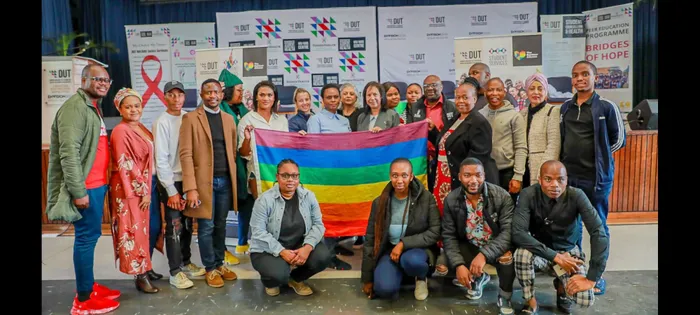University launches Rainbow Alliance

DUT LGBTQIA+ society, in collaboration with the DUT Department of Student Counselling and Health Unit, hosted their official Rainbow Alliance launch at the Indumiso Campus, Pietermaritzburg.
All the colours of the rainbow were celebrated this week when the Durban University of Technology’s LGBTIQA+ (Lesbian, Gay, Bisexual, Transgender, Intersex, Queer/Questioning, and Allies+) society hosted their Rainbow Alliance launch in Pietermaritzburg.
This event was a collaboration with the DUT Department of Student Counselling and Health Unit.
The official DUT LGBTIQA+ Rainbow Alliance banner was unveiled by the DUT Student Services Management and representatives of the SRC and LGBTIQA+ society.
The logo is a polygonal heart shape, which serves as a timeless symbol of love, compassion and emotion. The core concept of the design is to embody students’ services values while celebrating inclusivity, diversity and unity.
The event was facilitated by the DUT Health Promotion Project Officer-Counselling and Health, Siphesihle Ngubo, as well as the DUT Midlands Student Counsel and Development Services Director Fathima Haffajee.
Ms Haffajee welcomed the guests including the Dean of Students, Dr Clement Moreku; Director of Student Counselling and Health, Dr Naseem Haniff; Student Representative Council Social and Welfare, guest speaker, Leticia Sishi; HIV/AIDS coordinator, Thobile Zulu, and other clubs and societies.
“We commit to ensuring that there is no stigma or discrimination within our communities. We affirm our shared commitment to an equal society and equal rights for all of us. It is historic that the DUT LGBTIQA+ white chapter is being created in the Midlands. Initially, this club was known as Impilo Yami (Midland’s campuses and Shadows in the Rainbow) respectively it was founded as a student organisation in both campuses 15 years ago,” said Ms Haffajee.
She added that they truly admire the DUT-wide inauguration of the new society and members of the Shadows in the Rainbow. She said they are looking forward to the new DUT-wide alliance.
Dr Haniff said she hopes that this society can work with everyone to dismantle barriers and lead the march in terms of creating a more inclusive culture at DUT.
“We should be able to respect the rights and experiences of all of us who are members of this community. Not just the LGBTQIA community, but everyone should actively engage with this club and society. We need to attend their events, participate in discussions, and educate ourselves about issues that this community faces because they are us and we are them. Let us foster an environment where everyone feels seen, heard, and valued,” said Dr Haniff.
Dr Moreku said it is necessary to discuss the challenges faced by the LGBTQIA+ society on campus.
“There is a need for programmes specifically aimed at addressing challenges experienced by the LGBTQIA+ society on campuses. In most cases, these programmes will be integrated with diversity initiatives that address stigma and discrimination,” said Dr Moreku.
“The programmes should promote an enabling atmosphere in and around campus by creating networks, support structures, and services that are welcoming to students. This launch acts as a first step towards the institution’s transition. Higher education institutions should act as transformation incubators, addressing discriminatory tendencies openly, sympathetically, and regarding human rights.”
Leticia Sishi, a DUT student, shared her experience as a transgender woman. She has worked in several LGBTQIA+ related organisations and has been a leader in empowering transgender people and individuals - in particular transgender women.
Ms Sishi also has a catering firm that she established in 2019 to build skills and empower the transgender community. She has advocated for various seminars within the LGBTQIA+ community to combat prejudice in communities.